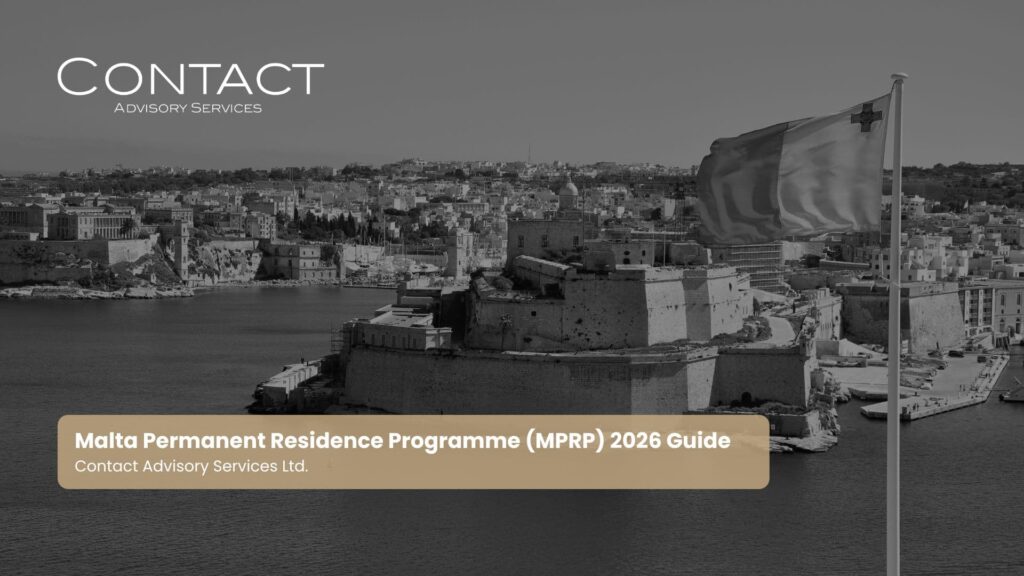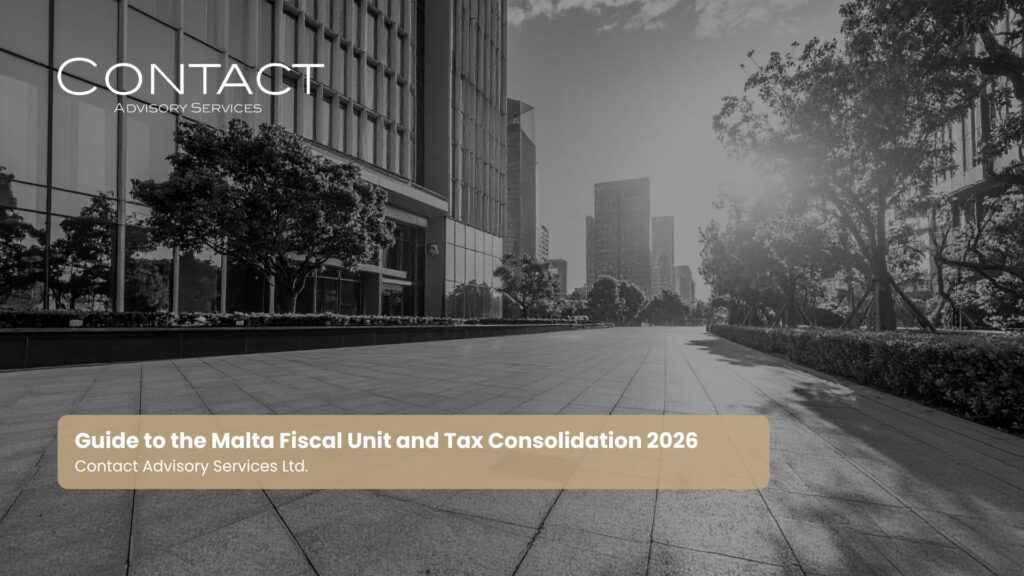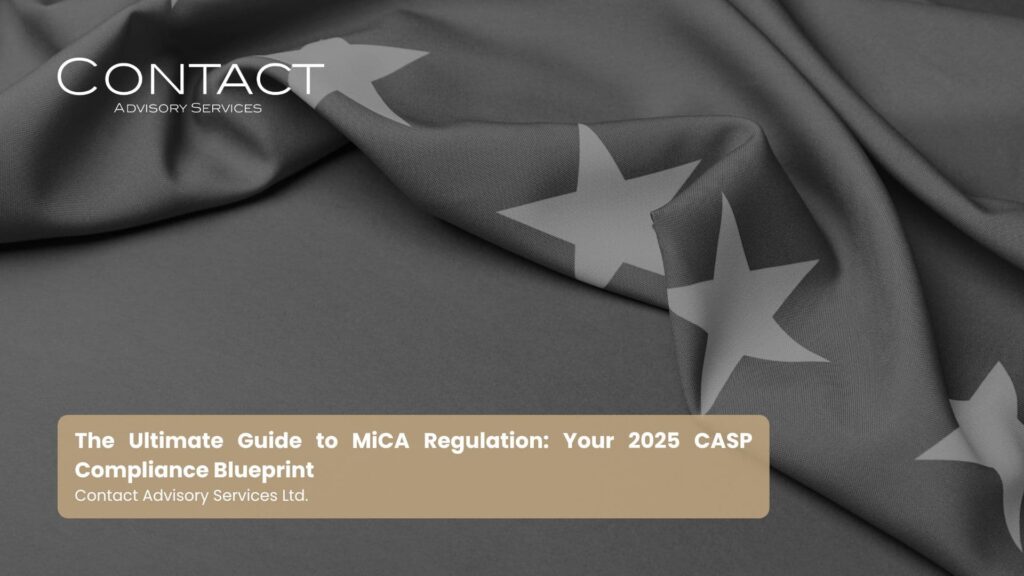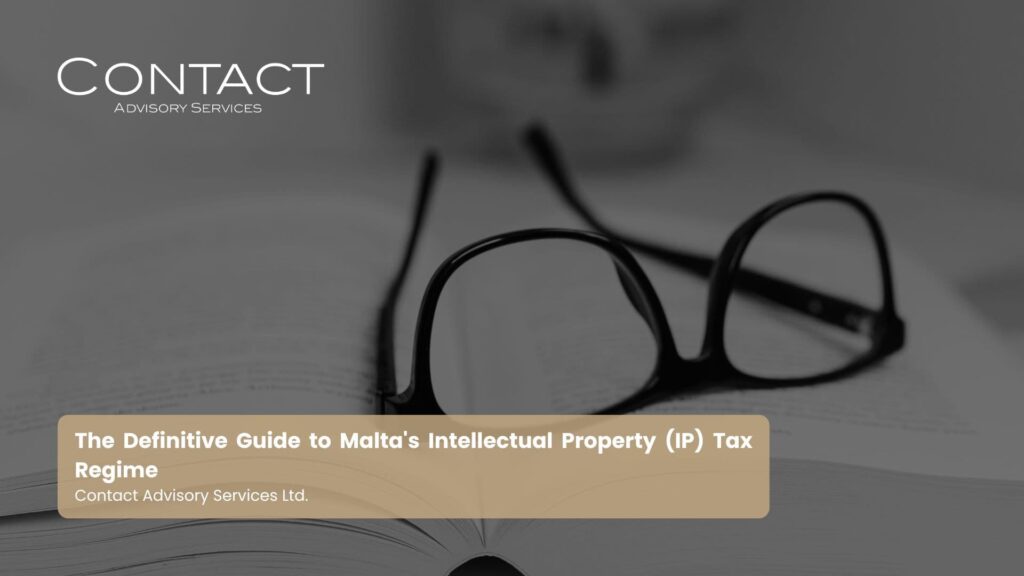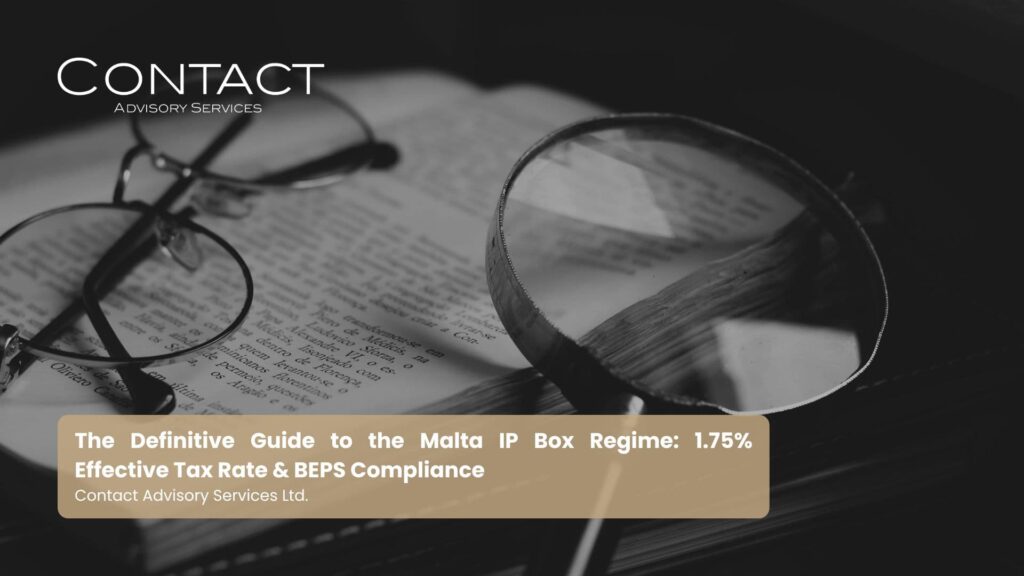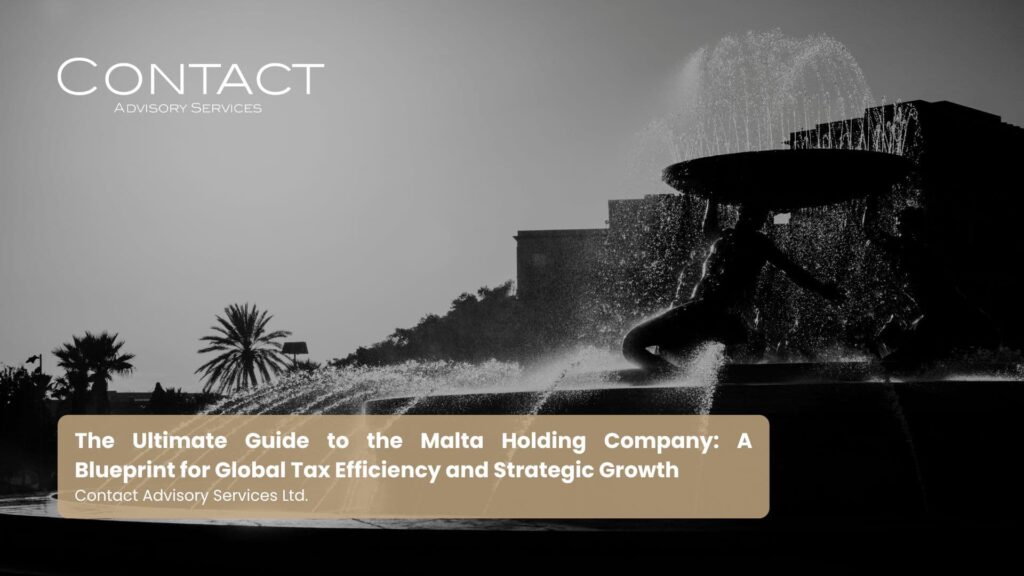Are you a multinational corporation, an international investor, or a family office grappling with the complexities of cross-border taxation? The challenge of minimising tax leakage on dividends and capital gains from subsidiaries is a constant battle, eroding returns and complicating your corporate structure. What if there was a robust, EU-compliant solution that could offer a 100% tax exemption on this income, providing both fiscal efficiency and legal certainty?
Welcome to the world of the Malta Participation Exemption. This powerful tax incentive is the cornerstone of Malta’s appeal as a premier holding company jurisdiction. It’s not a temporary loophole or a complex deferral mechanism; it’s a legislated, straightforward exemption that can fundamentally transform how your business manages its international investments. As an MFSA-authorized Company Services Provider, we at Contact Advisory Services Ltd. have guided countless clients through the intricacies of this regime. This guide is designed to be the most exhaustive resource available, demystifying every facet of the Malta Participation Exemption, from its core principles to its practical application and strategic advantages. We will delve into the qualifying conditions, navigate the anti-abuse provisions, compare it with other jurisdictions, and provide a clear roadmap for implementation. Prepare to discover how Malta can become the strategic heart of your international corporate structure.
What Exactly Is the Malta Participation Exemption?
The Malta Participation Exemption is a key provision in Malta’s tax law that provides a 100% tax exemption on dividends and capital gains derived from a qualifying “Participating Holding.” This means a Maltese company does not pay any corporate income tax in Malta on the profits it receives from its qualifying shareholdings, making it an exceptionally efficient vehicle for holding international investments.
The Participation Exemption (PE) is arguably the single most important feature of Malta’s corporate tax system for international business. Enshrined in Article 12 of the Maltese Income Tax Act, it is not a tax credit or a deferral, but a full and final exemption. When a Maltese company receives a dividend from a subsidiary in which it holds a “Participating Holding,” that dividend income can be fully excluded from its taxable income. Similarly, if the Maltese company sells the shares in that same subsidiary, any capital gain arising from the sale is also completely exempt from tax in Malta.
This creates a highly efficient, tax-neutral pipeline for profits to flow from operating subsidiaries around the world, through a Maltese holding company, and ultimately to investors. The core purpose of this regime is to prevent double taxation on the same profits – once at the level of the subsidiary and again at the level of the holding company. By eliminating this second layer of tax, Malta establishes itself as an ideal location for centralising the ownership of international group assets. It’s a clear, transparent, and fully EU-compliant system that has been vetted and approved, offering long-term stability and predictability for corporate planners.
Who Can Benefit from Malta’s Participation Exemption?
The Malta Participation Exemption is primarily designed for Maltese resident companies and Maltese permanent establishments of foreign companies that hold shares in other entities. It benefits multinational corporations, private equity firms, family offices, and international investors seeking to centralise their shareholdings and manage international profit repatriation in a tax-efficient manner.
The beauty of the PE lies in its broad applicability. Any company that is resident in Malta, regardless of the nationality of its ultimate shareholders, can potentially benefit. This includes private limited liability companies (Ltd.), public limited companies (PLC), and even Maltese permanent establishments of foreign entities that have been allocated the relevant shareholdings. The regime is designed to be flexible and cater to a wide range of corporate structures and investment strategies.
Which types of Maltese companies are eligible to claim the exemption?
Any company that is resident for tax purposes in Malta is eligible to claim the Participation Exemption. This includes private and public limited companies incorporated in Malta, as well as companies incorporated overseas but managed and controlled from Malta, making them Maltese tax residents.
The key determinant is tax residency. A company is considered tax resident in Malta if it is either incorporated in Malta or, if incorporated abroad, its management and control are exercised in Malta. This provides significant flexibility. For instance, an existing holding company from another jurisdiction could potentially be redomiciled to Malta (if its original jurisdiction permits) or have its management and control shifted to Malta to become tax resident and thus eligible for the PE. The primary vehicle used for this purpose is the Maltese private limited liability company, known for its straightforward incorporation process and flexible corporate governance. For expert guidance on establishing the right corporate entity, consider our Malta company formation services.
What kind of income does the Participation Exemption cover?
The Participation Exemption specifically covers two types of income: dividends derived from a qualifying Participating Holding and capital gains realised from the disposal of that same Participating Holding. It does not apply to other income streams like interest, royalties, or trading income.
The scope is precise and targeted, focusing on the returns generated from equity investments.
- Dividends: This includes all distributions of profits from the subsidiary company to the Maltese parent company. It covers both interim and final dividends. The exemption ensures that profits which have likely already been taxed in the subsidiary’s jurisdiction are not taxed again when they arrive in Malta.
- Capital Gains: This applies to the profit made when the Maltese company sells or otherwise disposes of its shares in the subsidiary. This is particularly powerful for corporate groups planning future restructurings, mergers, acquisitions, or strategic exits from investments, as it allows the full value to be realised tax-free at the holding company level.
It’s crucial to understand that the PE is not a blanket exemption on all corporate profits. If the Maltese company also engages in trading, financing, or licensing activities, the income from those activities will be subject to Malta’s standard 35% corporate tax rate (though other relief mechanisms, such as the tax refund system, may apply to that income).
What Constitutes a “Participating Holding”?
A “Participating Holding” is a specific legal and tax concept in Malta that defines a qualifying equity investment. A Maltese company is deemed to have a Participating Holding if it meets at least one of six alternative conditions, the most common of which is holding at least 5% of the equity shares in the subsidiary company.
This definition is the gateway to the entire Participation Exemption regime. It is not enough for a Maltese company to simply own shares in another company; that shareholding must qualify as a “Participating Holding.” The law provides flexibility by offering six distinct conditions, any one of which is sufficient to qualify. This ensures that various types of strategic investments, not just majority stakes, can benefit from the exemption. Let’s explore each of these conditions in detail.
How is the primary equity holding condition satisfied?
The most common way to satisfy the Participating Holding condition is for the Maltese company to hold at least 5% of the equity shares in the subsidiary company. This condition focuses purely on the nominal value of the equity capital held and is the most straightforward test to meet.
This is the benchmark condition. The term “equity shares” refers to shares that grant the holder rights to a share of the company’s profits and capital. The Maltese company must hold a minimum of 5% of the total nominal value of these shares in the subsidiary. This is a clear, bright-line test that is easy to verify from the subsidiary’s share register. For many corporate structures, where a holding company is set up to own a significant stake in an operating subsidiary, this 5% threshold is easily met.
What if the 5% equity threshold is not met?
If the Maltese company holds less than 5% of the equity, it can still qualify as a Participating Holding by meeting any one of the five alternative conditions. These conditions relate to the value of the investment, the rights of the shareholder, or the strategic nature of the holding.
Recognising that not all strategic investments involve a 5% stake, the law provides the following alternatives. Meeting just one is sufficient:
- Significant Investment Value: The Maltese company holds an investment in the subsidiary with an acquisition value of at least €1,164,000 (or its equivalent in any foreign currency). This holding must be maintained for an uninterrupted period of at least 183 days. This condition allows large-value investments, even if they represent a small percentage of a very large company, to qualify.
- Option to Acquire the Balance: The Maltese company has the option to acquire the remaining balance of the equity shares in the subsidiary. This condition caters to phased acquisition strategies or buy-out agreements, where the Maltese company has a contractual right to eventually take full control.
- Right of First Refusal: The Maltese company is entitled to the right of first refusal to purchase the remaining equity shares in the subsidiary should the other shareholders decide to sell. This signifies a strategic relationship beyond that of a passive investor.
- Board Representation: The Maltese company is entitled to appoint a director to the Board of Directors of the subsidiary. This right to participate in the management and governance of the subsidiary is a strong indicator of a strategic, non-passive investment.
- Furtherance of Own Business: The shareholding is held for the furtherance of the Maltese company’s own business, and the holding is not held as “trading stock” for the purpose of a trade. This is a more subjective test, often used where a Maltese company holds shares in a key supplier, distributor, or joint venture partner that is integral to its own business operations. A clear business and strategic link must be demonstrated.
This multi-faceted definition provides exceptional flexibility, ensuring that the benefits of the Participation Exemption are available to a wide array of legitimate and strategic corporate holding structures.
Summary of Participating Holding Conditions
| Condition No. | Requirement | Key Consideration |
| 1 | Holds at least 5% of the equity shares in the subsidiary. | Most common and straightforward test. |
| 2 | Investment value is at least €1,164,000 (held for 183+ days). | For high-value, low-percentage stakes. |
| 3 | Option to acquire the remaining balance of the equity shares. | Relevant for acquisition and buyout scenarios. |
| 4 | Right of first refusal on the remaining equity shares. | Demonstrates a strategic interest. |
| 5 | Entitlement to appoint a director to the subsidiary’s board. | Indicates active participation in governance. |
| 6 | Holding is for the furtherance of the company’s own business (not trading stock). | For strategic investments in related businesses. |
What Are the Anti-Abuse Provisions for the Participation Exemption?
For dividends to be exempt, the Participating Holding must satisfy at least one of three anti-abuse conditions. These conditions are designed to ensure the exemption is not used to shield income from non-taxed or low-taxed jurisdictions that is primarily passive. These anti-abuse provisions do not apply to capital gains.
While the Participation Exemption is broad, it is not unconditional, particularly concerning dividend income. To prevent its misuse, Malta has incorporated robust anti-abuse rules that are aligned with EU directives and international best practices (such as BEPS). These rules must be satisfied when a Maltese company receives a dividend from a Participating Holding. Importantly, these conditions do not apply to capital gains derived from the disposal of a Participating Holding, making the exemption for capital gains unconditional and highly attractive.
For dividends, the subsidiary in which the Participating Holding is held must satisfy at least one of the following three tests:
What is the EU/EEA residency test?
The first anti-abuse test is met if the subsidiary is resident or incorporated in a country within the European Union (EU) or the European Economic Area (EEA). This is the simplest and most direct safe harbour rule.
This is a straightforward geographical test. If the company paying the dividend is a tax resident in any EU member state (e.g., Germany, France, Italy) or an EEA country (e.g., Norway, Iceland, Liechtenstein), the anti-abuse condition is automatically satisfied. No further questions are asked regarding the subsidiary’s tax rate or income sources. This makes holding shares in other EU/EEA companies through a Maltese holding company extremely efficient and simple.
What is the “subject to tax” test?
The second test is met if the subsidiary is subject to foreign tax at a nominal rate of at least 15%. This test looks at the headline corporate tax rate in the subsidiary’s jurisdiction, not the effective tax rate it actually pays.
If the subsidiary is located outside the EU/EEA, this condition comes into play. The key here is the term “subject to any foreign tax.” This tax must be a corporate income tax or a similar tax. The nominal rate in the subsidiary’s country of residence must be at least 15%. For example, if a Maltese company has a subsidiary in the UK, where the nominal corporate tax rate is well above 15%, this condition is met. The fact that the subsidiary might have utilised tax credits or allowances to reduce its effective tax rate below 15% is irrelevant for the purpose of this test.
What is the “not more than 50% passive income” test?
The third test is met if the subsidiary does not derive more than 50% of its total income from “passive interest or royalties.” This condition ensures that the exemption is not used for profits generated by shell companies that are merely funnelling passive income.
This is the most complex of the three tests. It requires an analysis of the subsidiary’s income streams. The subsidiary “fails” this test if more than half of its income consists of passive interest or royalties. “Passive interest or royalties” is defined as interest or royalty income that has not been derived from a trade or business and which has been taxed at a foreign rate of less than 5%.
Essentially, this rule targets income from entities in low-tax jurisdictions that are not engaged in active business operations. For example, if a subsidiary in a zero-tax jurisdiction earns 60% of its income from interest on loans and has no other business, it would fail this test. However, if that subsidiary is an active manufacturing company, a trading business, or even a financing company whose interest income is part of an active trade, it would likely pass this test.
What happens if none of the anti-abuse tests are met?
If a dividend is received from a Participating Holding that fails all three anti-abuse tests, the dividend is not exempt but is instead taxed at 35%. However, the Maltese company can claim a double taxation relief credit, and importantly, the tax paid in Malta can be subject to a full 100% refund to the shareholders, resulting in a 0% effective tax rate.
In the rare case where a dividend fails all three primary tests, Malta’s tax system provides an alternative route to prevent double taxation. Instead of an exemption, the dividend income becomes taxable in Malta at the standard 35% rate. The key benefits are:
- Double Taxation Relief: The Maltese company can claim a credit for any foreign tax (including underlying tax) paid by the subsidiary on the profits being distributed.
- Full (100%) Tax Refund: When the Maltese company distributes its own dividend out of these profits, its shareholders can claim a 100% refund of the Maltese tax paid.
The net result is that, even in the worst-case scenario where the anti-abuse conditions are not met, the system is designed to achieve a 0% effective tax rate on the dividend income after the refund mechanism is applied. This provides an exceptional safety net and ensures Malta remains competitive even for holdings in more exotic jurisdictions. However, relying on the refund system introduces an administrative step and a cash flow consideration (tax is paid first, then refunded), which is why satisfying one of the main exemption criteria is always the preferred route.
How Does the Participation Exemption Apply to Dividends?
When a Maltese company receives a dividend from a qualifying Participating Holding that meets one of the anti-abuse criteria, that dividend income is fully exempt from corporate tax in Malta. The company can simply opt in its tax return to not declare this income, resulting in a 0% tax charge with no further complexity.
The application of the PE to dividend income is the most common use of the regime. It creates a seamless flow of profits from subsidiary to parent. Let’s break down the practical steps and implications.
What are the conditions for exempting dividend income?
To exempt dividend income, two sets of conditions must be met concurrently. First, the shareholding must qualify as a “Participating Holding,” and second, the subsidiary paying the dividend must satisfy one of the three anti-abuse provisions (EU/EEA, 15% tax rate, or <50% passive income).
This is a two-step check that must be performed for every dividend received:
- Check the Holding: Does our shareholding in the subsidiary meet one of the six Participating Holding criteria (e.g., do we own at least 5%)?
- Check the Subsidiary (Anti-Abuse): Is the subsidiary resident in the EU? If not, is it subject to a tax rate of at least 15%? If not, does less than 50% of its income come from passive interest or royalties?
If the answer to the first question is “yes” and the answer to any part of the second question is “yes,” the dividend is eligible for the 100% exemption. This check should be documented for compliance purposes. As your corporate services provider, Contact Advisory Services Ltd. would handle this verification as part of our ongoing compliance services.
What is the process for claiming the exemption on dividends in a tax return?
The Maltese company claims the exemption by making a simple election in its annual income tax return. It formally declares its choice to apply the Participation Exemption to the qualifying dividend income, which is then excluded from the calculation of its taxable profits.
The process is administratively straightforward. There is no need for pre-approval or special rulings from the Maltese tax authorities. When preparing the annual tax computation and return, the qualifying dividend income is identified. The company then exercises its option to exempt this income. The income and the choice to exempt it are disclosed in the tax return, but the amount is not added to the taxable base. This results in a final tax liability of zero on that income stream. This simplicity and certainty are major advantages of the Maltese system.
What are the implications for withholding taxes?
Malta does not levy any withholding tax on outbound dividends distributed by a Maltese company to its non-resident shareholders, irrespective of their location or status. This ensures that profits which have benefited from the Participation Exemption can be passed on to the ultimate investors without any further tax leakage in Malta.
This is a critical final piece of the puzzle. It is not enough for the holding company to receive profits tax-free; it must also be able to distribute those profits to its own shareholders without a further layer of tax. Malta’s domestic law provides a full exemption from withholding tax on dividends paid to non-residents. This applies whether the shareholder is an individual or a corporation, and whether they are in the EU or outside the EU. This “zero-rated” exit route makes the Maltese holding company a complete and highly effective solution for international profit repatriation.
How Does the Participation Exemption Apply to Capital Gains?
The Participation Exemption provides a 100% tax exemption on any capital gains realised by a Maltese company from the disposal of a Participating Holding. Crucially, this exemption is unconditional and not subject to the anti-abuse provisions that apply to dividends.
While the dividend exemption is powerful, the capital gains exemption is arguably even more so due to its simplicity and certainty. When a corporate group decides to restructure, sell a subsidiary, or exit an investment, the ability to do so without incurring a large tax charge is of paramount strategic importance.
Are there anti-abuse provisions for capital gains?
No, there are no anti-abuse provisions attached to the capital gains exemption. As long as the shares being sold qualify as a “Participating Holding,” any gain arising from their disposal is automatically and unconditionally exempt from tax in Malta.
This is a major distinguishing feature of the Maltese regime. Unlike the rules for dividends, you do not need to check if the subsidiary is in the EU, what tax rate it pays, or what kind of income it earns. The only question is: Do the shares being sold meet one of the six conditions to be a Participating Holding?
If the answer is yes, the exemption is guaranteed. This provides immense certainty for M&A activity, private equity exits, and internal group reorganisations. It allows assets to be transferred within a group or sold to third parties with maximum fiscal efficiency, as the full proceeds can be realised by the Maltese holding company without any tax friction in Malta.
What constitutes a “disposal of shares” for this purpose?
A “disposal” is broadly defined and includes not only a sale of shares but also other transfers like a liquidation of the subsidiary, a share buy-back, or a share-for-share exchange. This ensures the exemption applies to a wide range of corporate transactions.
The concept of disposal covers any event that transfers the ownership of the shares from the Maltese company. This includes:
- A straightforward sale to a third party for cash.
- An intra-group transfer as part of a reorganisation.
- The cancellation of shares following a liquidation of the subsidiary, where the Maltese company receives a liquidating distribution.
- A redemption or buy-back of shares by the subsidiary itself.
- A share exchange as part of a merger or acquisition.
This broad interpretation ensures that the tax benefit is not lost due to the technical form of the transaction. The focus is on the substance: the Maltese company is relinquishing its ownership of the Participating Holding.
How does this benefit group restructuring and exits?
The unconditional capital gains exemption makes Malta an ideal platform for group restructurings and investment exits. It allows a group to consolidate its holdings under a Maltese entity and subsequently divest from those holdings or reorganise them without triggering any corporate tax on the accrued capital appreciation.
Consider a corporate group with various subsidiaries scattered across the globe. By transferring the ownership of these subsidiaries to a central Maltese holding company (which could itself be a tax-neutral event, depending on the jurisdictions involved), the group creates a single, efficient platform. When the time comes to sell one of these subsidiaries, the sale can be executed by the Maltese company. Any gain, which could be substantial if the subsidiary has grown in value over many years, will be received entirely tax-free in Malta. These tax-free proceeds can then be reinvested into new ventures or distributed to the ultimate shareholders without any Maltese withholding tax. This makes Malta a superior location for private equity funds, venture capitalists, and corporate M&A departments.
How Does Malta’s Participation Exemption Compare to Other Jurisdictions?
Malta’s Participation Exemption regime is highly competitive when compared to other major European holding jurisdictions like Cyprus, Luxembourg, and the Netherlands. Its key advantages often lie in the simplicity of its capital gains exemption, the lack of withholding taxes, and the flexibility of its “Participating Holding” definition.
While several countries offer attractive holding regimes, the devil is always in the detail. A side-by-side comparison reveals the unique strengths of the Maltese system. At Contact Advisory Services Ltd., we regularly perform these comparative analyses for clients to ensure they choose the jurisdiction that best fits their specific needs.
Comparative Overview of EU Holding Company Regimes
| Feature | Malta | Cyprus | Luxembourg | Netherlands |
| Minimum Holding % (Dividends) | 5% (or alternatives) | 1% | 10% or €1.2m investment | 5% |
| Minimum Holding % (Capital Gains) | 5% (or alternatives) | 1% | 10% or €6m investment | 5% |
| Minimum Holding Period | No (except for the €1.164m value test – 183 days) | No | 12 months | No |
| Anti-Abuse Rules for Dividends? | Yes (EU/EEA, or 15% tax, or <50% passive income) | Yes (similar to Malta, subject to tax) | Yes (subject to tax provisions) | Yes (motive test, asset test) |
| Anti-Abuse Rules for Capital Gains? | No | No | Yes (subject to tax provisions) | Yes (motive test, asset test) |
| Outbound Dividend WHT | 0% | 0% | 15% (reduced by treaties/EU directives) | 15% (reduced by treaties/EU directives) |
| Outbound Capital Gains Tax | 0% | 0% (on non-Cypriot real estate rich companies) | 0% | 0% |
| EU/OECD Compliance | Fully Compliant | Fully Compliant | Fully Compliant | Fully Compliant |
What are the advantages of Malta’s PE over the Cyprus regime?
While the Cyprus regime is very similar and also highly competitive, Malta’s key advantage often lies in its broader Double Taxation Treaty network and its robust and stable regulatory environment as a long-standing EU member state. Both offer unconditional capital gains exemptions, but Malta’s legal and financial infrastructure is often perceived as more developed.
Cyprus and Malta are often the top two contenders for a holding company location. Both have a 0% withholding tax on outbound dividends and a full exemption on capital gains from the disposal of shares. However, Malta may be preferred by clients seeking a jurisdiction with a more extensive treaty network, which can be crucial for reducing withholding taxes on payments into the holding company (e.g., dividends from a subsidiary in a third country). Furthermore, Malta’s financial services ecosystem, regulated by the single Malta Financial Services Authority (MFSA), is highly regarded for its diligence and stability.
How does Luxembourg’s participation exemption differ from Malta’s?
Luxembourg’s regime is more stringent, typically requiring a higher holding percentage (10% vs. Malta’s 5%) and a 12-month minimum holding period. Crucially, Luxembourg imposes a 15% withholding tax on dividends to non-EU/treaty partners and applies its anti-abuse rules to capital gains, whereas Malta does not.
Luxembourg is a traditional holding jurisdiction, particularly for investment funds. However, for a standard corporate holding company, Malta often proves more flexible and efficient. The key differences are:
- Withholding Tax: This is a major differentiator. Luxembourg’s default 15% WHT on dividends can create tax leakage where a treaty or the EU Parent-Subsidiary Directive does not provide a full exemption. Malta’s 0% WHT is universal.
- Capital Gains Conditions: In Luxembourg, the exemption on capital gains is subject to the same “subject to tax” conditions as dividends. In Malta, it is completely unconditional, providing far greater certainty.
- Minimum Holding Period: The 12-month holding period in Luxembourg can restrict flexibility for shorter-term investments or faster-paced restructurings. Malta has no such general requirement.
Is the Dutch participation exemption a better alternative?
The Dutch participation exemption can be more complex, featuring a “motive test” to determine if the holding is for investment diversification rather than as a strategic subsidiary. Like Luxembourg, the Netherlands also has a 15% default withholding tax, making Malta’s 0% rate a significant advantage for distributions outside the EU.
The Netherlands is another top-tier jurisdiction, but its rules can be less straightforward. The Dutch regime introduces subjective tests, such as the “motive test,” which examines the purpose of the investment. If the holding company is deemed to be a passive portfolio investor in a low-taxed subsidiary, the exemption may not apply. Malta’s rules, based on clear, objective criteria (EU/EEA, tax rate, income type), offer greater predictability. Again, the 0% outbound withholding tax in Malta is a decisive advantage over the Dutch 15% rate for many international structures.
What Are the Practical Steps to Set Up a Maltese Holding Company to Utilize the PE?
Setting up a Maltese holding company involves a clear, regulated process: an initial consultation for structuring, the formal incorporation of a Maltese limited company, registration for tax purposes, and establishing ongoing governance and compliance procedures. Partnering with an authorized provider like Contact Advisory Services Ltd. ensures a smooth and compliant setup.
Leveraging the Participation Exemption begins with establishing the correct corporate vehicle in Malta. This is a process we have perfected over many years. Here is a step-by-step guide to what you can expect.
- Step 1: Initial Consultation and Strategic Structuring:
This is the most critical phase. Before any documents are filed, we work with you to understand your international structure, your investment portfolio, and your long-term goals. We analyse the nature of your subsidiaries to ensure they will meet the Participating Holding and anti-abuse criteria. We advise on the optimal share capital, governance structure, and how the new Maltese company will be integrated into your existing group.
- Step 2: Company Incorporation Process:
This is the formal establishment of your company. It involves:
- Name Reservation: Choosing and reserving a unique name for your company with the Malta Business Registry (MBR).
- Drafting the M&A: Preparing the Memorandum and Articles of Association, the company’s constitutional documents.
- Submitting Documentation: Filing the M&A, along with KYC (Know Your Customer) documents for the directors, shareholders, and ultimate beneficial owners, with the MBR.
- Issuance of Certificate of Incorporation: Once the MBR is satisfied, it issues the certificate, and the company legally exists. This process is efficient and can often be completed within a few working days.
- Step 3: Tax Registration:
Immediately following incorporation, the new company must be registered with the Maltese tax authorities (the Commissioner for Tax and Customs). This involves obtaining a tax identification number (TIN) and registering for other applicable taxes, such as VAT, if required (though a pure holding company often does not need to be VAT registered).
- Step 4: Bank Account Opening and Capital Injection:
We assist in opening a corporate bank account in Malta or another suitable jurisdiction. The shareholders then deposit the initial share capital into this account.
- Step 5: Ongoing Governance and Compliance:
Once established, the company must adhere to Maltese law. This includes maintaining proper accounting records, holding board meetings (which can be important for demonstrating management and control in Malta), and filing annual returns and tax returns. Our role at Contact Advisory Services Ltd. extends to providing comprehensive administrative and compliance support to ensure your company remains in good standing.
What documents are required for incorporation?
For incorporation, you will typically need a certified copy of the passport and a recent utility bill for all directors, shareholders, and beneficial owners. You will also need to provide the proposed company name, the business objects, and details of the share capital.
The documentary requirements are focused on fulfilling international anti-money laundering (AML) and counter-terrorism financing (CTF) obligations. The standard KYC package includes:
- For Individuals:
- Certified true copy of a valid passport or national ID card.
- Proof of residential address (e.g., a recent utility bill or bank statement, not older than 3 months).
- A professional reference letter or bank reference.
- A curriculum vitae (CV).
- For Corporate Shareholders:
- Certificate of Incorporation.
- Memorandum and Articles of Association.
- A recent Certificate of Good Standing.
- A register of directors and shareholders.
- KYC documents for the ultimate beneficial owners (UBOs) of the corporate shareholder.
What are the ongoing annual requirements?
A Maltese holding company must file an annual return with the Malta Business Registry, prepare and submit audited financial statements, and file an annual corporate income tax return with the tax authorities. These are the core compliance obligations to keep the company in good standing.
Maintaining your Maltese company requires adherence to a clear annual compliance calendar:
- Annual Return: A yearly confirmation of the company’s details (directors, shareholders, registered office) filed with the MBR.
- Audited Financial Statements: All Maltese companies must have their annual financial statements audited by a certified public auditor in Malta. These must be approved by the board and shareholders and filed with the MBR.
- Corporate Income Tax Return: A tax return must be filed annually, even if all the company’s income is exempt under the PE. This is where the exemption is formally claimed.
- Board and Shareholder Meetings: Proper corporate governance dictates that regular meetings should be held and minuted.
What Are Common Pitfalls to Avoid When Using the Malta Participation Exemption?
Common pitfalls include failing to meet the specific “Participating Holding” definition, overlooking the anti-abuse rules for dividends, poor record-keeping, and neglecting corporate substance requirements, which could expose the structure to challenges from foreign tax authorities.
While the PE is powerful, it is not automatic. Proper planning and ongoing management are essential to avoid issues. In our experience, these are the most common mistakes to watch out for:
- Failing to Meet the “Participating Holding” Definition: A company might assume it qualifies simply by owning shares. It’s crucial to ensure at least one of the six conditions is clearly met and documented, especially if relying on one of the more subjective conditions like “furtherance of business.”
- Ignoring the Anti-Abuse Provisions for Dividends: Companies sometimes forget to perform the three-pronged check (EU/EEA, tax rate, passive income) for each dividend received from a non-EU subsidiary. This can lead to an unexpected tax liability if the dividend is not, in fact, exempt.
- Poor Record-Keeping: It is vital to maintain clear records supporting the PE claim. This includes share registers of subsidiaries, financial statements of subsidiaries (to verify the passive income test), and board resolutions approving the acquisition of investments and receipt of dividends.
- Substance and Management Issues: In the post-BEPS world, it is crucial that the Maltese holding company has sufficient substance. This means demonstrating that management and control are genuinely exercised in or from Malta. Having a Maltese registered office and director, holding board meetings in Malta, and maintaining records in Malta are important indicators of substance. A “paper” company with no real presence in Malta could be disregarded by foreign tax authorities or under a tax treaty.
- Incorrectly Classifying Income: Mistaking other forms of income, such as interest on a shareholder loan or a royalty payment, for an exempt dividend can lead to compliance issues. The PE is strictly limited to dividends and capital gains on equity shares.
Frequently Asked Questions (FAQ)
This section answers common questions about the Malta Participation Exemption, such as whether there is a minimum holding period, its applicability to partnerships, the treatment of non-resident shareholders, and how losses from a subsidiary are treated.
Is there a minimum holding period to qualify for the Participation Exemption?
Generally, there is no minimum holding period required to benefit from the Participation Exemption for either dividends or capital gains. The only exception is if you are relying on the €1,164,000 investment value condition, which requires the investment to be held for an uninterrupted period of 183 days.
Does the Participation Exemption apply to holdings in partnerships or trusts?
No, the Participation Exemption in Malta is specifically designed for holdings in entities that have a share capital and are treated as companies. It does not apply to income or gains derived from interests in partnerships, trusts, or other transparent entities.
What if the subsidiary makes a loss? Can that loss be offset in Malta?
No, because the income (dividends) and gains from a Participating Holding are exempt from tax, any losses incurred by that subsidiary, or a capital loss on its disposal, cannot be used to offset other taxable income of the Maltese company. The regime is symmetrical: gains are not taxed, and losses are not deductible.
Does the nationality or residence of the Maltese company’s shareholders matter?
No, the benefits of the Participation Exemption and the 0% withholding tax on outbound dividends are available irrespective of the nationality or tax residence of the shareholders of the Maltese company. The system is equally accessible to EU and non-EU investors.
Can the Participation Exemption be combined with Malta’s tax refund system?
Not directly on the same income stream. If income is exempt under the PE, there is no tax paid, and therefore nothing to refund. The tax refund system applies to taxable income (e.g., from trading or interest), not to exempt income. A Maltese company can, however, have both exempt PE income and taxable income that qualifies for a refund.
Is a tax ruling required from the Maltese authorities to use the PE?
No, a tax ruling is not required. The Participation Exemption is applied by law, and the company self-assesses its eligibility and claims the exemption in its tax return. This provides a high degree of certainty and administrative ease.
What is the impact of Controlled Foreign Company (CFC) rules?
Malta has implemented CFC rules in line with the EU’s Anti-Tax Avoidance Directive (ATAD). However, these rules generally do not impact income that would be exempt under the Participation Exemption. There are specific safe harbours that prevent the CFC rules from overriding the PE on dividends and capital gains from genuine business operations. Careful structuring is key.
Does the PE apply to any class of shares?
The PE applies to “equity shares,” which are shares that entitle the holder to a stake in the company’s profits and assets. It generally would not apply to non-participating preference shares that only provide a fixed dividend.
Conclusion: Your Strategic Gateway to Global Investment
The Malta Participation Exemption is more than just a tax incentive; it’s a comprehensive, stable, and strategically advantageous framework for managing international investments. Its powerful combination of a 100% exemption on both dividends and capital gains, an unconditional exemption for gains, a universal 0% withholding tax on outbound dividends, and its full compliance with EU and international standards makes it a world-class solution.
By establishing a Maltese holding company, you create a central hub that not only insulates your investment returns from tax leakage but also provides a flexible platform for future growth, restructuring, and exits. The clarity of its rules and the relative simplicity of its administration remove the uncertainty that often plagues cross-border corporate structures.
Navigating the nuances of international tax requires expert guidance. The potential pitfalls of substance, documentation, and correct application mean that partnering with a knowledgeable and authorized provider is not just advisable—it’s essential for success. At Contact Advisory Services Ltd., we possess the deep expertise and hands-on experience required to structure your Maltese holding company correctly from day one and to ensure its seamless, compliant operation for years to come.
Your Next Step
Are you ready to leverage Malta’s premier holding company regime to unlock the full potential of your international investments? Don’t let tax friction erode your returns. Take the first step towards a more efficient and robust corporate structure today.
Contact our team of experts at Contact Advisory Services Ltd. for a confidential, no-obligation consultation. Let us show you how the Malta Participation Exemption can work for you.
Email us at info@contact.com.mt or call us to schedule your appointment.
Disclaimer: The information on this website is for general informational purposes only and does not constitute professional advice. We make no representations or warranties regarding its accuracy or completeness. Always contact our team and arrange for a consultation before acting on any information presented here.


